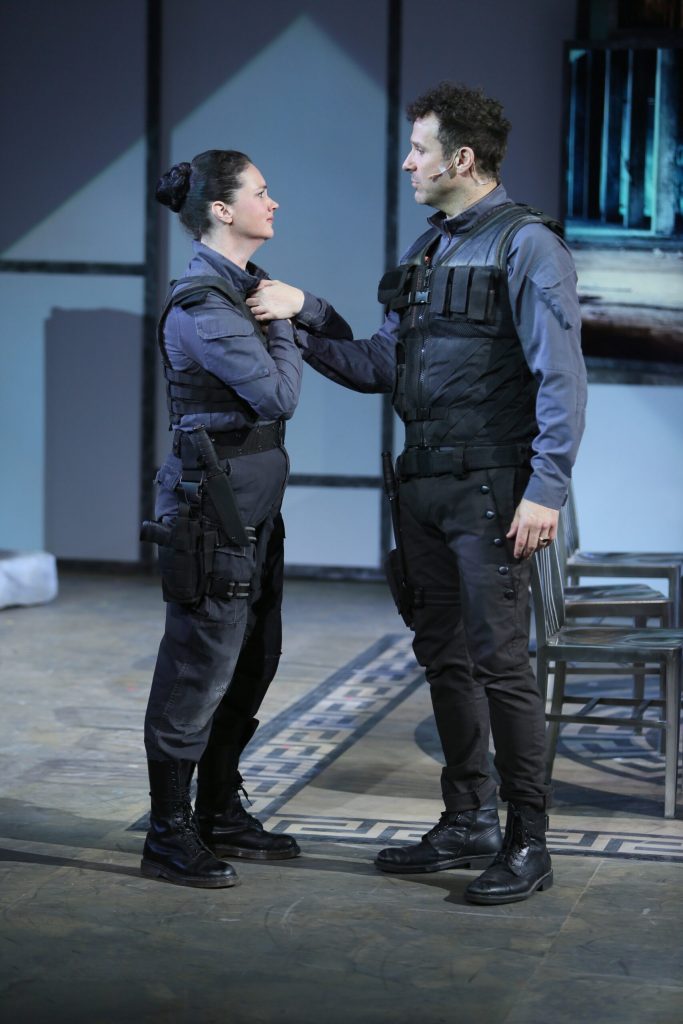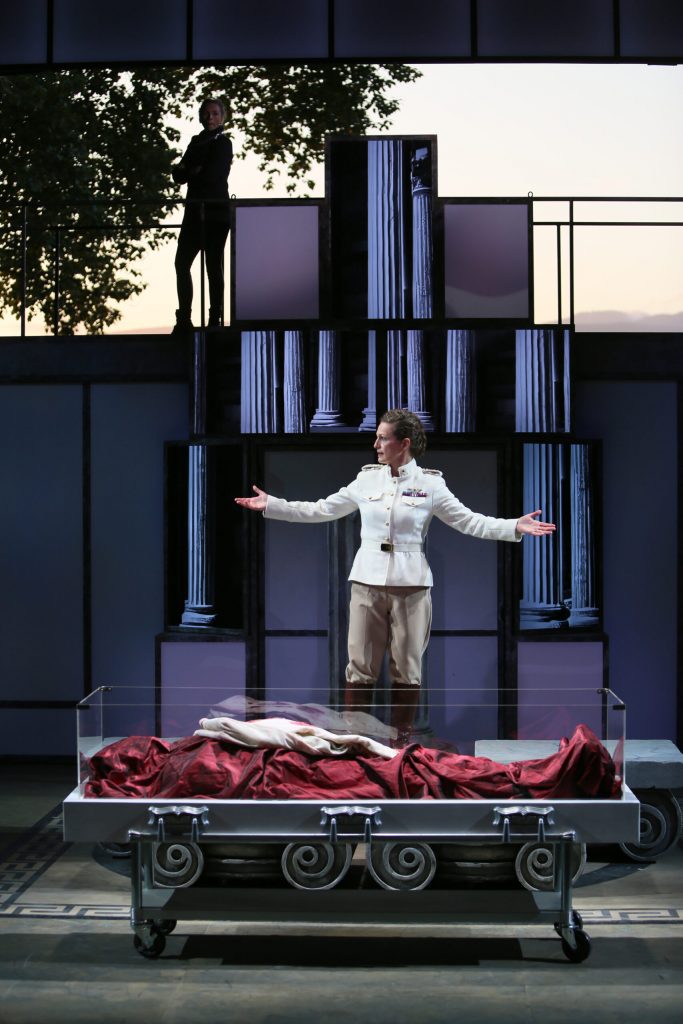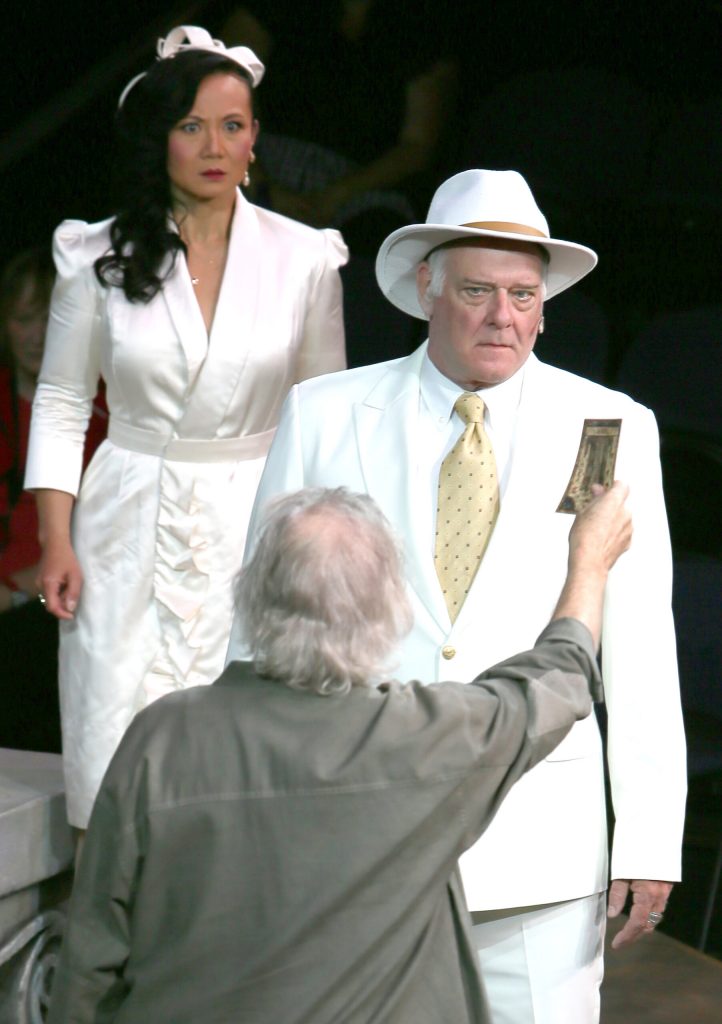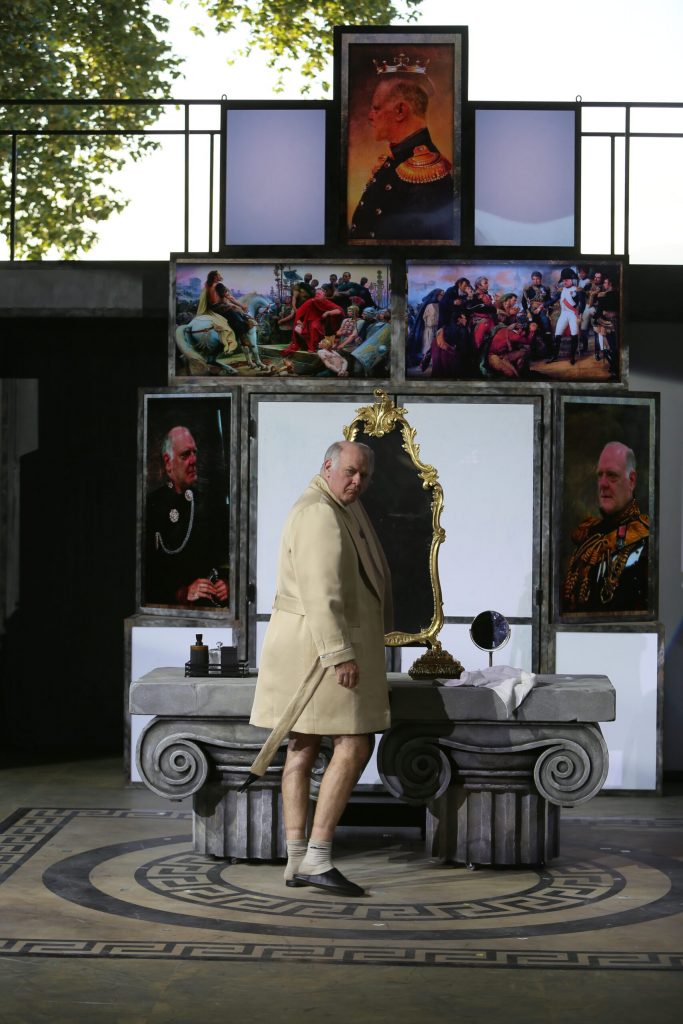
Credit: Tim Matheson
Bard on the Beach to September 24, 2023
Tickets from $30 at 604-739-0559 or www.bardonthebeach.org
Posted June 26, 2023
In 2018 when Bard on the Beach announced director Daryl Cloran’s Beatles-inspired adaptation of As You Like It, lots of eyes rolled. But when the play opened, we laughed in spite of ourselves; it broke all box office records and Bard brought it back this season. Again we are laughing.
When it was announced that Julius Caesar was coming in the Bard on the Beach 2023 season with women in many of the significant males roles – including Jennifer Lines as Mark Antony – some were intrigued, some were sceptical and there probably was some eye-rolling. The biggest risk, it seemed, was casting funnyman Andrew McNee, as Brutus. For years, McNee has been making us laugh with merely a raised eyebrow, a look, a sigh. He’s a spectacularly talented comic actor but, we wondered, would he have the gravitas for Brutus who, after all, is the central figure in Julius Caesar in spite of the name of the play. In a word: yes. He delivers the goods.

Credit: Tim Matheson
McNee makes so palpable Brutus’s inner turmoil: his love for Caesar versus his love for Rome. Be prepared to be moved close to tears as McNee almost embraces Andrew Wheeler (as Caesar) before plunging his dagger into the man he loves. It is Caesar’s ambition – not the man himself – that Brutus has become convinced needs to be extinguished. There are a few – very few – moments when the funny McNee bleeds through but, after all, Brutus was a man, a husband, a soldier, and probably not without a sense of humour. When at the end of the play McNee calls for his young attendant Lucius (Evan Rein), for example, McNee’s shrug and little laugh, is classic McNee. It works.

Credit: Tim Matheson
No one doubted that Jennifer Lines would make an admirable, credible Mark Antony. Lines has, chameleon-like, played the gamut of roles from comic to tragic over the length of her career. She gracefully, elegantly, turns on a dime. What she does bring to this role is a tremendous sense of Antony’s affection for Caesar prior to the assassination. The play opens following a big public celebration at which Caesar is thrice offered the emperor’s crown. A smiling, enthusiastic Antony accompanies him and the relationship appears to be almost one of father and son. Caesar is flushed, all pumped up, full of himself and making the Trump-like gesture of beaming and pointing to people in the crowd. It’s a subtle but telling reference to the US ex-President.
Lines said in an interview that she had been studying the rules of rhetoric in anticipation of the massively pivotal “Friends, Romans, countrymen” speech. We see her transition from appearing to flatter the assassins as “honourable men” to using the same phrase, like a hammer, repeatedly to damn them. The shift is masterfully accomplished so that by the end of Antony’s eulogy, the crowd is ready to lynch the killers. Civil war is inevitable.
And then we see Antony move from recently mourning Caesar to supplanting him with the help of Octavius (Oscar Derkx). Antony, Lines makes clear, is not without ambition, either.

Credit: Tim Matheson
Director Cherissa Richards brings to the forefront Calpurnia (Sharon Crandall), Caesar’s wife, and Portia (Chelsea Rose), Brutus’s wife, thereby truly humanizing both Caesar and Brutus and placing them in a personal context as opposed to the political realm where, traditionally, we usually see them.
Outstanding is Emma Slipp as the venomous Cassius. Slipp shows us without any doubt that her character is motivated purely by jealously, not love of Rome, while the rest of the senators are, like Brutus, simply swayed by her vitriol.
I could have done with less of the concluding battle scene with guns, artillery and shooting. There is just so much of that on TV and film; my guest, however, said she was genuinely scared.
Set design by Pam Johnson makes use of the same basic layout of As You Like It with the addition of some handsome, readily moveable bits of broken Roman columns. Choreographer/fight director is Jonathan Hawley Purvis; lighting design is by Gerald King. Costumer Jessica Oostergo creates costumes that bridge the gap between Shakespeare’s era and our own – especially the black on black ensembles on the senators. Putting Caesar all in white (trousers, jacket, shoes and hat) – à la Trump – is inspired.

Credit: Tim Matheson
Adapted by Stephen Drover, this is a Julius Caesar you can wrap your head around. It is clear, tight and fast-paced with a decidedly contemporary feel. Yevgeny Prigozhin’s short-lived rebellion against Putin’s regime makes this production incredibly timely. The parallels are obvious: concern that the arrogance and ambition of the Russian leader now negatively impact the nation drew – however briefly – a group of mercenaries to challenge him.
Julius Caesar is a terrific play for our time, once again amazing us that four hundred years after Shakespeare’s death, his work is still so relevant.

